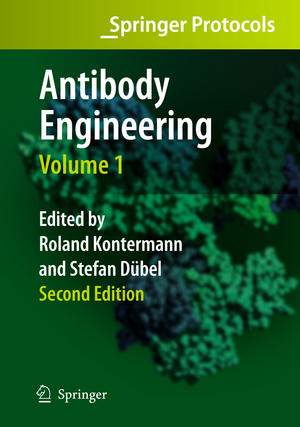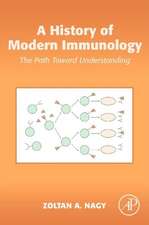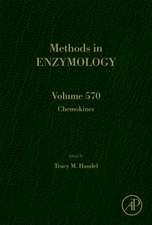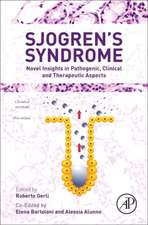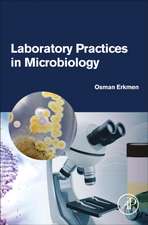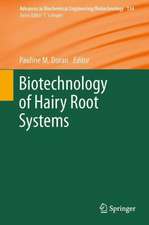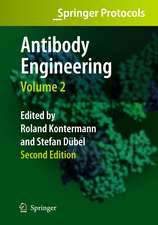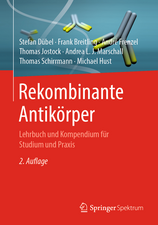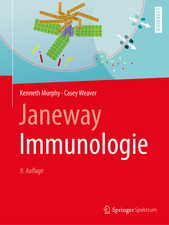Antibody Engineering Volume 1: Springer Protocols Handbooks
Editat de Roland E. Kontermann, Stefan Dübelen Limba Engleză Hardback – 26 mar 2010
| Toate formatele și edițiile | Preț | Express |
|---|---|---|
| Paperback (1) | 2314.31 lei 6-8 săpt. | |
| Springer Berlin, Heidelberg – 26 mar 2010 | 2314.31 lei 6-8 săpt. | |
| Hardback (1) | 2329.29 lei 6-8 săpt. | |
| Springer Berlin, Heidelberg – 26 mar 2010 | 2329.29 lei 6-8 săpt. |
Din seria Springer Protocols Handbooks
- 18%
 Preț: 782.42 lei
Preț: 782.42 lei - 5%
 Preț: 1817.13 lei
Preț: 1817.13 lei - 18%
 Preț: 1120.18 lei
Preț: 1120.18 lei -
 Preț: 403.91 lei
Preț: 403.91 lei - 15%
 Preț: 662.30 lei
Preț: 662.30 lei - 18%
 Preț: 1855.11 lei
Preț: 1855.11 lei - 18%
 Preț: 1918.09 lei
Preț: 1918.09 lei - 18%
 Preț: 896.08 lei
Preț: 896.08 lei - 15%
 Preț: 644.82 lei
Preț: 644.82 lei - 20%
 Preț: 593.48 lei
Preț: 593.48 lei - 18%
 Preț: 966.27 lei
Preț: 966.27 lei - 18%
 Preț: 952.09 lei
Preț: 952.09 lei - 5%
 Preț: 737.11 lei
Preț: 737.11 lei - 15%
 Preț: 648.24 lei
Preț: 648.24 lei - 18%
 Preț: 984.44 lei
Preț: 984.44 lei - 18%
 Preț: 977.34 lei
Preț: 977.34 lei - 18%
 Preț: 1674.20 lei
Preț: 1674.20 lei - 18%
 Preț: 1841.06 lei
Preț: 1841.06 lei - 18%
 Preț: 970.87 lei
Preț: 970.87 lei - 18%
 Preț: 1588.19 lei
Preț: 1588.19 lei - 18%
 Preț: 1029.13 lei
Preț: 1029.13 lei - 5%
 Preț: 677.07 lei
Preț: 677.07 lei - 18%
 Preț: 1250.74 lei
Preț: 1250.74 lei - 5%
 Preț: 723.78 lei
Preț: 723.78 lei - 18%
 Preț: 900.18 lei
Preț: 900.18 lei - 18%
 Preț: 800.55 lei
Preț: 800.55 lei - 15%
 Preț: 645.60 lei
Preț: 645.60 lei - 5%
 Preț: 1487.03 lei
Preț: 1487.03 lei - 15%
 Preț: 645.47 lei
Preț: 645.47 lei
Preț: 2329.29 lei
Preț vechi: 2451.89 lei
-5% Nou
Puncte Express: 3494
Preț estimativ în valută:
445.76€ • 484.03$ • 374.44£
445.76€ • 484.03$ • 374.44£
Carte tipărită la comandă
Livrare economică 22 aprilie-06 mai
Preluare comenzi: 021 569.72.76
Specificații
ISBN-13: 9783642011436
ISBN-10: 3642011438
Pagini: 800
Ilustrații: XIII, 788 p.
Dimensiuni: 178 x 254 x 50 mm
Greutate: 1.47 kg
Ediția:2nd ed. 2010
Editura: Springer Berlin, Heidelberg
Colecția Springer
Seria Springer Protocols Handbooks
Locul publicării:Berlin, Heidelberg, Germany
ISBN-10: 3642011438
Pagini: 800
Ilustrații: XIII, 788 p.
Dimensiuni: 178 x 254 x 50 mm
Greutate: 1.47 kg
Ediția:2nd ed. 2010
Editura: Springer Berlin, Heidelberg
Colecția Springer
Seria Springer Protocols Handbooks
Locul publicării:Berlin, Heidelberg, Germany
Public țintă
ResearchCuprins
Cloning of the Antigen-binding Site from Hybridoma.- Cloning of Variable Domains from Mouse Hybridoma by PCR.- Coning Hybridoma cDNA by RACE.- Construction of scFv Fragments from Hybridoma or Spleen Cells by PCR Assembly.- Generation of Antibody Repertoires.- Mouse Immune Libraries for the Generation of ScFv Fragments Directed Against Human Cell Surface Antigens.- Human Antibody Gene Libraries.- Synthetic Antibody Libraries.- Immune Libraries from Nonhuman Primates (NHP).- Generation of Rabbit Immune Libraries.- Selection of Antibody Fragments from Combinatorial Libraries.- Immunotube Selections.- Phage Display and Selection in Microtitre Plates.- Phage Display and Selections on Biotinylated Antigens.- Phage Display and Subtractive Selection on Cells.- Selection of Phage Antibody Libraries for Binding and Internalization into Mammalian Cells.- Improving Phage Display Throughput by Using Hyperphage, Miniaturized Titration and pVIII (g8p) ELISA.- Yeast Display and Selections.- The Generation of Transgenic Mice Expressing Human Antibody Repertoires.- Selection of Antibody Fragments by Means of the Filter-Sandwich Colony Screening Assay.- Semi-automated Magnetic Bead-Based Antibody Selection from Phage Display Libraries.- Engineering and Production of Immunoglobulins.- Aspects of Isotype Selection.- Generation of Heavy and Light Chains (Chimeric Antibodies).- Humanising Antibodies by CDR Grafting.- Humanization by Resurfacing.- Human Antibodies by Guided Selection.- In Silico De-Immunization.- Affinity Maturation by Chain Shuffling and Site Directed Mutagenesis.- Affinity Maturation by Random Mutagenesis and Phage Display.- Engineering of the Fc Region for Improved PK (FcRn Interaction).- Antibody-Dependent Enzyme Prodrug Therapy (ADEPT).- Production of Recombinant Human IgG Antibodies in the Baculovirus Expression System.- Expression of IgA Molecules in Mammalian Cells.- Antibody Characterization.- Expression of Complete Antibodies in Transgenic Plants.- Expression ofFull Length Monoclonal Antibodies (mAb) in Algal Chloroplast.- Expression of IgG Antibodies in Mammalian Cells.- Protein A/G Chromatography.- Epitope Analysis Using Synthetic Peptide Repertoires Prepared by SPOT Synthesis Technology.- Epitope Mapping by Printed Peptide Libraries.- Antibody Epitope Mapping Using Yeast Display.- Size Exclusion Chromatography.- Structural Characterization of Antibodies by Mass Spectrometry.- Antibody Glycans Characterization.- Affinity Measurements by Competition ELISA.- Anti-Histidine Antibodies as Tools for Reversible Capturing of His-Tagged Fusion Proteins for Subsequent Binding Analysis.- Affinity Measurements Using Quartz Crystal Microbalance (QCM).- Affinity Measurements with Radiolabeled Antibodies.- Neutralization Tests.- Functional Characterization of Antibodies Neutralizing Soluble Factors In Vitro and In Vivo.- Competitive ELISA.- Quantification of Human IgG and Related Fc Fusion Proteins by a Human IgG/Fc Capture ELISA.- Determination of Fc-Mediated Antibody-Effector Functions by Chromium Release Assay.- Binding Studies with Flow Cytometry.
Textul de pe ultima copertă
Antibodies are indispensable tools for research, diagnosis, and therapy. Recombinant approaches allow the modification and improvement of nearly all antibody properties, such as affinity, valency, specificity, stability, serum half-life, effector functions, and immunogenicity.
Antibody Engineering provides a comprehensive toolbox covering the well-established basics but also many exciting new techniques. The protocols reflect the latest "hands on" knowledge of key laboratories in this still fast-moving field. Newcomers will benefit from the proven step-by-step protocols, which include helpful practical advice; experienced antibody engineers will appreciate the new ideas and approaches. The book is an invaluable resource for all those engaged in antibody research and development.
Antibody Engineering provides a comprehensive toolbox covering the well-established basics but also many exciting new techniques. The protocols reflect the latest "hands on" knowledge of key laboratories in this still fast-moving field. Newcomers will benefit from the proven step-by-step protocols, which include helpful practical advice; experienced antibody engineers will appreciate the new ideas and approaches. The book is an invaluable resource for all those engaged in antibody research and development.
Caracteristici
The updated second edition of the successful Springer Lab Manual "Antibody Engineering" is now offered in two volumes with nearly the double number of protocols With both new and well established techniques Detailed step-by-step protocols including all materials and practical advices Includes supplementary material: sn.pub/extras
